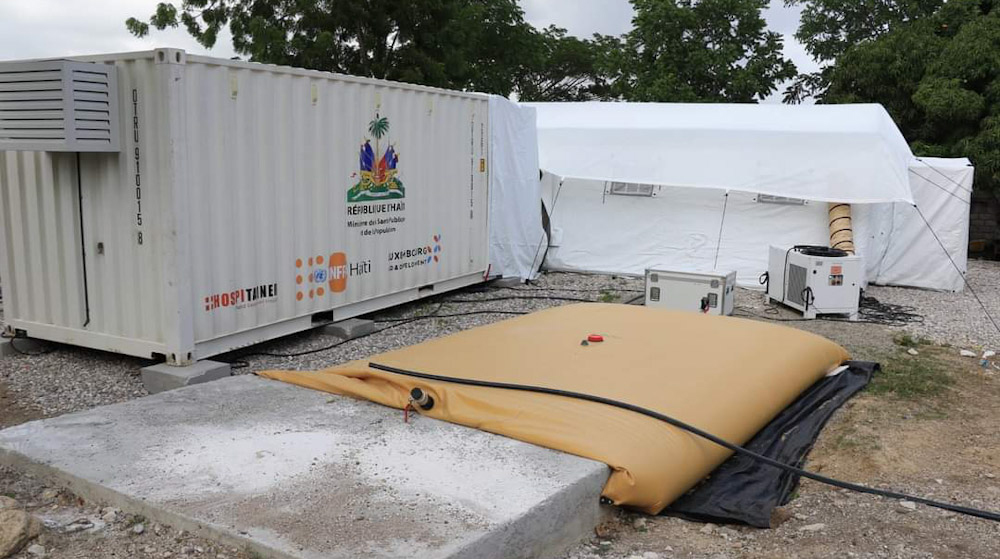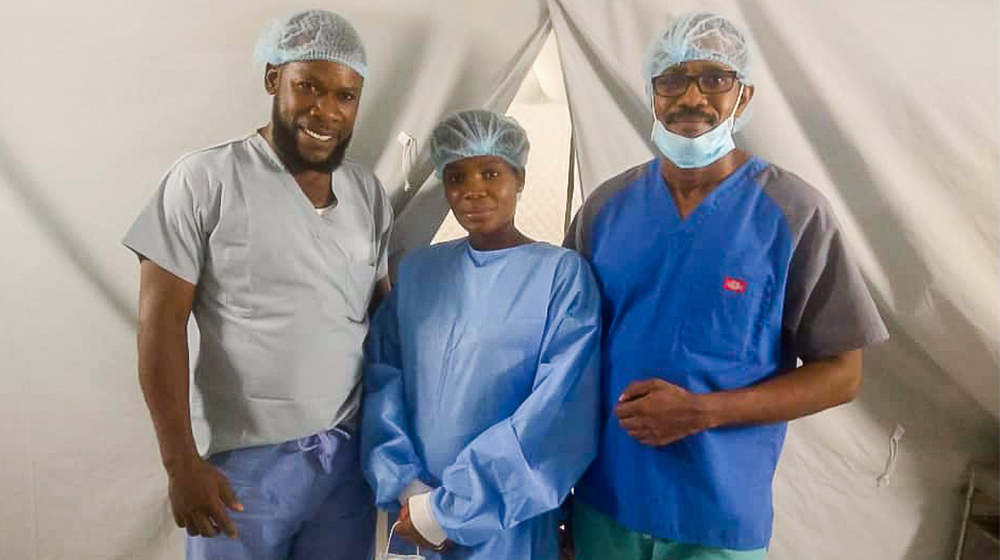Asile, Nippes, Haiti, October 22, 2022 --- UNFPA, the United Nations reproductive health agency, continues to always save lives in Haiti and in emergency situations.
UNFPA is shedding light today on the work of its obstetrician-gynecologist, Max Dervil, at the hospital of “Asile”, in the Nippes department alongside Medical Director Sonel Févry.
The hospitainers of Asile and Camp Perrin are granted by the Grand Duchy of Luxembourg to Haiti, with the support of UNFPA.
The UNFPA Representative in Haiti, Saidou Kabore, placed the activities in the hospital of “Asile” in the transformative goal of "Zero preventable maternal deaths, especially in humanitarian situations".
This hospitainer unit includes an operating room and will provide all the health services that the Community Reference Hospital (HCR) provided before its collapse by the earthquake of August 14, 2021. The hospitainer will serve all patients with surgical, obstetrical, and gynecological needs.
Since health services have been interrupted, UNFPA wanted to provide the Nippes and South departments with complete structures called "hospitainers" that will allow the management of surgical cases including emergencies and obstetrical complications. They are intended to restore the services interrupted after the earthquake. The hospitainers are located in Asile (Nippes department) and Camp Perrin (South department).
Obstetrician and gynecologist Max Dervil answers our questions.
What is the use of the hospitainer since its functioning?
On August 14, 2022, an earthquake measuring 7.2 on the Richter scale struck the southern departments of Haiti. The commune of Asile, in the Nippes, department was not spared. Several infrastructures collapsed, including a large part of the hospital including the maternity ward and the operating room.

The institution was no longer able to handle obstetrical emergencies. All women in need of a caesarean section were referred to the hospital ”Sainte Thérèse” in Miragôane, located approximately 56 kilometers away, or to the hospital “Saint Boniface” in Fond-des-Blanc, located 50 kilometers away from Asile.
It is with great gratitude that the community welcomed the relaunch of obstetrical interventions at the hospital by the start of activities in the hospitainer which comes at the right time in the current situation of fuel shortage, with roads frequently barricaded.
In this difficult context, referrals were becoming almost impossible, putting the lives of many vulnerable pregnant women in danger. Thanks to the hospitainer, a dozen caesarean sections and three hysterectomies have already been performed since the launch about four (4) weeks ago. A hysterectomy is a surgery performed to remove the uterus.
What does it mean to you to work in a context where you are trying to revive the activities of the hospital through the hospitainer?
It requires a lot of sacrifice and self-sacrifice. Because working in a maternity ward is stressful and very tiring at the same time. As soon as the activities are launched, they are impacted by the socio-political turbulence and the lack of fuel. The roads are blocked and the exorbitant increase in the price of transportation, which is provided by motorcycles at 1500 to 2000 gourdes per person depending on the route, has greatly reduced the number of people coming to the hospital. We are worried for all those women who will stay to give birth at home without the assistance of a qualified personnel.

Here, we don't have a completely formed care team. We must adapt to the situation. It is even more important when you are the one who has the skills to deal with the specific problems of pregnant women. Thanks to the hospitainer which offers an adequate technical platform, saving lives has become great again.
Tell us about the collaboration with your team?
A team is above all the result of a collective functioning centered on the patients. The Community Reference Hospital (HCR) of Asile does not have enough medical staff to adequately meet the requirements of the different services. Aware of the challenge posed by the functioning of the hospitainer unit in terms of staffing, the medical director, the administrator, and the head nurse are involved in a particular way. This involvement changes the usual division of labor in the hospital and leads to additional workloads for the rest of the nursing and support staff. This participation is essential to make the intervention framework operational at the hospitainer level and to offer quality care to women. The staff is always dedicated to giving their input and this has made our job easier.
What services do you provide? What are the constraints?
We have a containerized medical facility (Hospitainer) at the hospital, which is an independent structure designed to facilitate emergency obstetric care, one of the major pillars of reducing maternal mortality and providing essential health services to victims of sexual violence.
At Asile, we focus on the management of surgical emergencies related to complications of pregnancy, childbirth, and the immediate postpartum period. Prenatal consultations are provided mainly by the hospital staff and deliveries are done in mobile units designed and equipped for this purpose thanks to a donation from the Norwegians.
Our medical opinion is often sought to make or confirm a diagnosis. The main constraints we face are closely linked to the current situation: fuel shortage, difficulties in supplying inputs. These constraints are also inherent to the hospital, in terms of lack of nursing and support staff able to work in the operating room, and to maintain the equipment after the operations.
What has been the result of using the containerized hospital unit?
The hospitainer unit provides a functional care space with a minimal logistical footprint that has allowed easy surgeries without complications until now. All beneficiaries have progressed favorably and have left with satisfaction. Their relatives are delighted with the availability of this service at the hospital and describe it as providential. Given the current situation, it would be very difficult for them to travel to another hospital with the woman for treatment. As a result, high-risk pregnancies are now treated on site. They are no longer referred elsewhere, and complications are addressed with confidence and peace of mind.
Why do you continue to do this work despite the current situation?
No one is supposed to ignore that during crisis situations, as it is the case now, pregnant women will continue to give birth, and some will find themselves in complicated situations that will require surgical management. I am an obstetrician-gynecologist. For me, caring for women is a duty that does not need to be taught, and it is always with enthusiasm and passion that I give my services to this segment of the population that lives in remote areas, and that is most often destitute and vulnerable. No one should be left behind. This is UNFPA's commitment. I am a United Nations Volunteer, I am involved in the process of sustainable development, in this difficult context that the Haitian population is going through. I believe that God always places us where he wants us. Nothing happens by chance.


